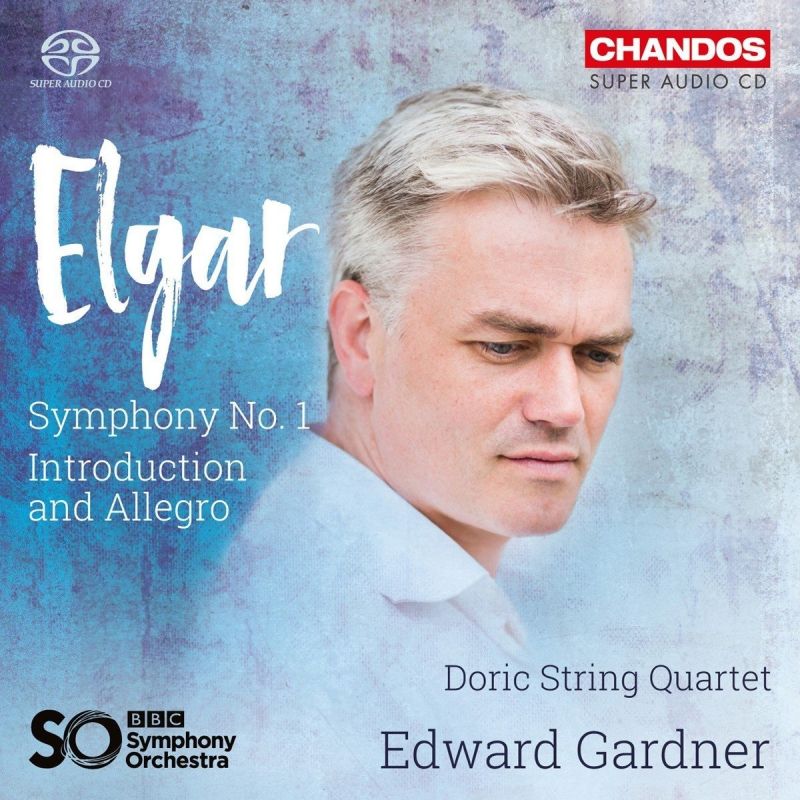ELGAR Symphony No 1. Introduction and Allegro
View record and artist detailsRecord and Artist Details
Composer or Director: Edward Elgar
Genre:
Orchestral
Label: Chandos
Magazine Review Date: 05/2017
Media Format: Super Audio CD
Media Runtime: 65
Mastering:
DDD
Catalogue Number: CHSA5181

Tracks:
| Composition | Artist Credit |
|---|---|
| Symphony No. 1 |
Edward Elgar, Composer
BBC Symphony Orchestra Edward Elgar, Composer Edward Gardner, Conductor |
| Introduction and Allegro |
Edward Elgar, Composer
BBC Symphony Orchestra Doric String Quartet Edward Elgar, Composer Edward Gardner, Conductor |
Author: Edward Seckerson
Elgar’s brilliant take on the Baroque concerto grosso – his Introduction and Allegro – is, of course, a lovely thing, the interplay between string quartet (the excellent Doric Quartet) and string orchestra assuming an almost mystic quality as the intimate and intensely personal are repeatedly writ large, larger, largest. Gardner’s great strength is the vitality and rhythmic snap he elicits from the larger string body of the BBC Symphony Orchestra. But there is inwardness and confidentiality too and it’s only the all-embracing warmth of a Barbirolli that I ultimately miss, not least in the cathartic final appearance of ‘the Welsh theme’ where a shade more indulgence, a more emphatic tug of emotion, is surely in order.
Moving to the First Symphony, Gardner clearly appreciates that we are dealing here with a study in conflict and change, evolution and transformation, musical and actual. Elgar’s British Empire was at the threshold of a new century and the piece he was writing was at once a premonition and a proclamation. His metaphor – the great ‘motto theme’ in all its nobilmente distinction – shall endure but the turbulent first movement will see it buffeted and swept along on winds of change with barely a moment to take stock of what might soon be gone for ever. Gardner is properly, fiercely impulsive though never at the expense of rhythmic clarity and the shape of the bigger picture. Those tempest-tossed remnants of lyric ephemera are discreetly savoured. They carry their own distinctly Elgarian nostalgia.
The brash militarism of the Scherzo – circumstance without the pomp – is again vital, if without the teutonic heft that Barenboim and his Berliners scarily brought to it in their recent, and sensational, Decca account. But the winding-down of the transition into the slow movement – where our noblest aspirations are celebrated – is perfection from Gardner, and the Adagio itself is heartfelt, bringing some very lovely playing from the BBC SO, especially when hushed and secretive, and inclined towards those rapt falling phrases so beloved of Elgar.
In the finale, I do wonder if Gardner’s handling of that ecstatically transformative passage (such a glorious surprise) at the heart of the movement is not, for all its tenderness, a little too restrained. He certainly makes us wait for the climax, violins keeping the emotionalism in check before the swelling of cellos and horns sweeps us off our feet.
But there’s no escaping the fact that Gardner arrives in the wake of Barenboim – a hard, if impossible act to follow, as revelatory an account of the symphony as I have heard in many a year.
Discover the world's largest classical music catalogue with Presto Music.

Gramophone Digital Club
- Digital Edition
- Digital Archive
- Reviews Database
- Full website access
From £8.75 / month
Subscribe
Gramophone Full Club
- Print Edition
- Digital Edition
- Digital Archive
- Reviews Database
- Full website access
From £11.00 / month
Subscribe
If you are a library, university or other organisation that would be interested in an institutional subscription to Gramophone please click here for further information.




